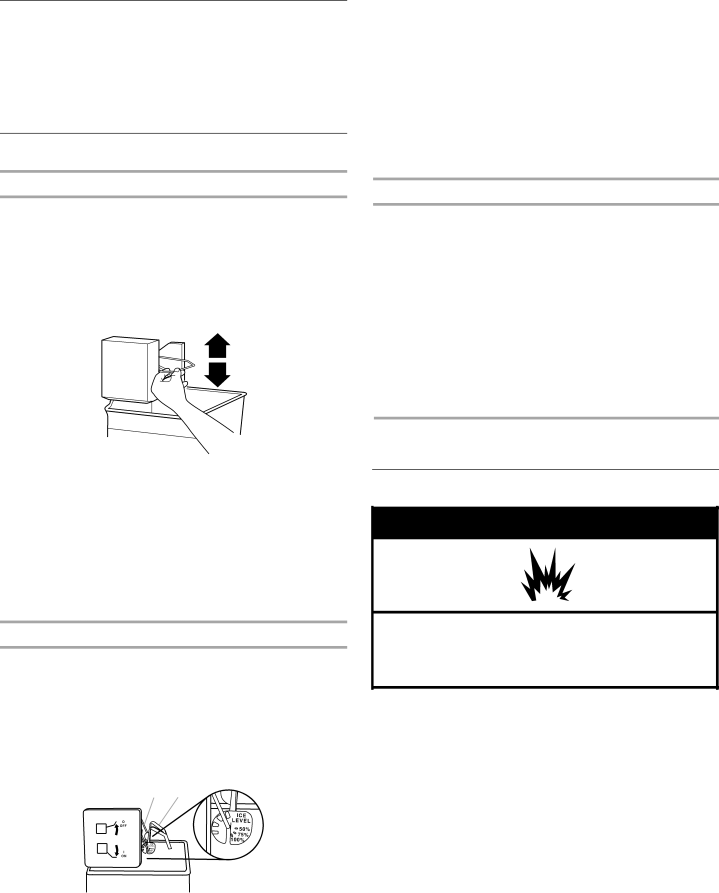
Crisper Humidity Control
(on some models)
You can control the amount of humidity in the
LOW (open) for best storage of fruits and vegetables with skins.
HIGH (closed) for best storage of fresh, leafy vegetables.
Ice Maker
Style 1
To Turn the Ice Maker On/Off:
To turn the ice maker ON, simply lower the wire shutoff arm.
To manually turn the ice maker OFF, lift the wire shutoff arm to the OFF (arm up) position and listen for the click.
NOTE: Your ice maker has an automatic shutoff. As ice is made, the ice cubes will fill the ice storage bin and the ice cubes will raise the wire shutoff arm to the OFF (arm up) position. Do not force the wire shutoff arm up or down.
Ice Production Rate:
■The ice maker should produce approximately 8 to 12 batches of ice in a
■To increase ice production, lower the freezer and refrigerator temperature. See “Using the Controls.” Wait 24 hours between adjustments.
■For maximum ice production (on some models), push the switch to ICE PLUS. The ice maker should produce 16 to 20 batches of ice in a
Style 2
To Turn the Ice Maker On/Off:
To turn the ice maker ON, simply lower the wire shutoff arm.
To manually turn the ice maker OFF, lift the wire shutoff arm to the OFF (arm up) position and listen for the click.
NOTE: Your ice maker has an automatic shutoff. As ice is made, the ice cubes will fill the ice storage bin and the ice cubes will raise the wire shutoff arm to the OFF (arm up) position. Do not force the wire shutoff arm up or down.
A B
A. Wire shutoff arm
B. Ice level adjustment arm
Ice Production Rate:
■The ice maker should produce approximately 8 to 12 batches of ice in a
NOTE: Adjust the ice level by slightly pressing in on the ice level adjustment arm, to release it from the wire shutoff arm, and then moving it up or down to the desired setting.
■To decrease the amount of ice produced, move the ice level adjustment arm to the 75% or 50% position.
■For maximum ice production move the ice level adjustment arm to the 100% position.
Remember
■Allow 24 hours to produce the first batch of ice. Discard the first three batches of ice produced.
■The quality of your ice will be only as good as the quality of the water supplied to your ice maker. Avoid connecting the ice maker to a softened water supply. Water softener chemicals (such as salt) can damage parts of the ice maker and lead to poor quality ice. If a softened water supply cannot be avoided, make sure the water softener is operating properly and is well maintained.
■Do not use anything sharp to break up the ice in the bin. This can cause damage to the ice container and the dispenser mechanism.
■Do not store anything on top of or in the ice maker or ice bin.
REFRIGERATOR CARE
Cleaning
![]() WARNING
WARNING
Explosion Hazard
Use nonflammable cleaner.
Failure to do so can result in death, explosion, or fire.
Both the refrigerator and freezer sections defrost automatically. However, clean both sections about once a month to avoid buildup of odors. Wipe up spills immediately.
IMPORTANT:
■Because air circulates between both sections, any odors formed in one section will transfer to the other. You must thoroughly clean both sections to eliminate odors. To avoid odor transfer and drying out of food, wrap or cover foods tightly.
■For stainless steel models, stainless steel is corrosion- resistant and not
10